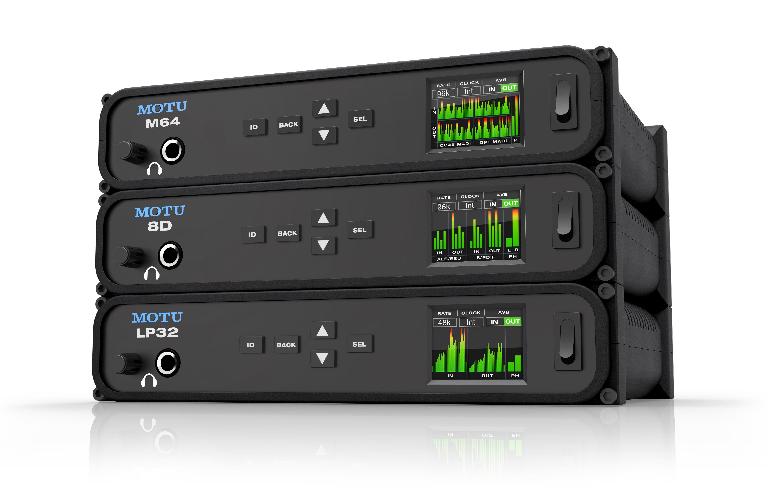ANAHEIM CONVENTION CENTER — NAMM SHOW 2017 — JANUARY 19, 2017 — MOTU (booth A6410) is debuting three new audio interfaces with complementary digital audio I/O configurations, flexible routing, stand-alone mixing, AVB/TSN networking and connectivity to a host computer through class compliant, high-speed USB 2.0 (compatible with USB 3.0 and iOS). All three units share the same advanced features as MOTU's other latest-generation interfaces, including proven, ultra low-latency USB drivers, flexible internal routing, 48-channel mixing, DSP effects and Wi-Fi control. The units include a front panel headphone jack with volume control for convenient monitoring and word clock I/O for resolving to other digital audio gear or house sync.
Housed in sturdy aluminum alloy half-rack enclosures, the M64, 8D and LP32 are ideal for routing digital audio streams in live performance systems, AVB/TSN network installations or recording studios of any size. An included mounting bracket kit allows two units to be joined side-by-side with each other, or mixed and matched with other MOTU half-rack units, to create a single rack-space configuration consisting of customized analog, digital and/or MIDI I/O tailored to the user's needs.
The M64 provides one bank of optical MADI I/O, plus a 2nd independent bank of coaxial MADI I/O on BNC connectors, for a total of 256 simultaneous MADI I/O channels. A duplicate BNC output is included for splitting the coax bank to two separate destinations, without the need for a separate splitter.
The 8D provides two stereo pairs (four channels) of AES3 digital I/O and two stereo pairs of RCA S/PDIF digital I/O, for a total of 8 digital I/O channels. The AES3 inputs are equipped with sample rate conversion for easy, trouble-free digital transfers.
The LP32 provides four banks of 8-channel ADAT optical "lightpipe" digital I/O for a total of 32 channels at 44.1/48 kHz or 16 channels of SMUX at 88.2/96 kHz. Each I/O bank is individually switchable between 8-channel ADAT, 4-channel SMUX or stereo TOSLink (optical S/PDIF).
For all three units, powerful DSP delivers large console style mixing with 48 channels, 12 stereo busses, and 32-bit floating point effects processing, including modeled analog EQ, vintage compression and classic reverb. Flexible routing patches ins to outs, or splits input channels to multiple destinations. Each unit can be used as a stand-alone mixer with wireless control from a tablet, smartphone and laptop — even multiple smart devices simultaneously — over shared Wi-Fi.
Using the unit's Ethernet port, users can connect another network-equipped MOTU interface for more I/O — or connect to an expanded AVB/TSN network with multiple interfaces and computers.
Price: The M64, 8D and LP32 will be $595 each.
Availability: The M64, 8D and LP32 will ship in Q1 of 2017.
Web: http://www.motu.com



 © 2024 Ask.Audio
A NonLinear Educating Company
© 2024 Ask.Audio
A NonLinear Educating Company
Discussion
Want to join the discussion?
Create an account or login to get started!